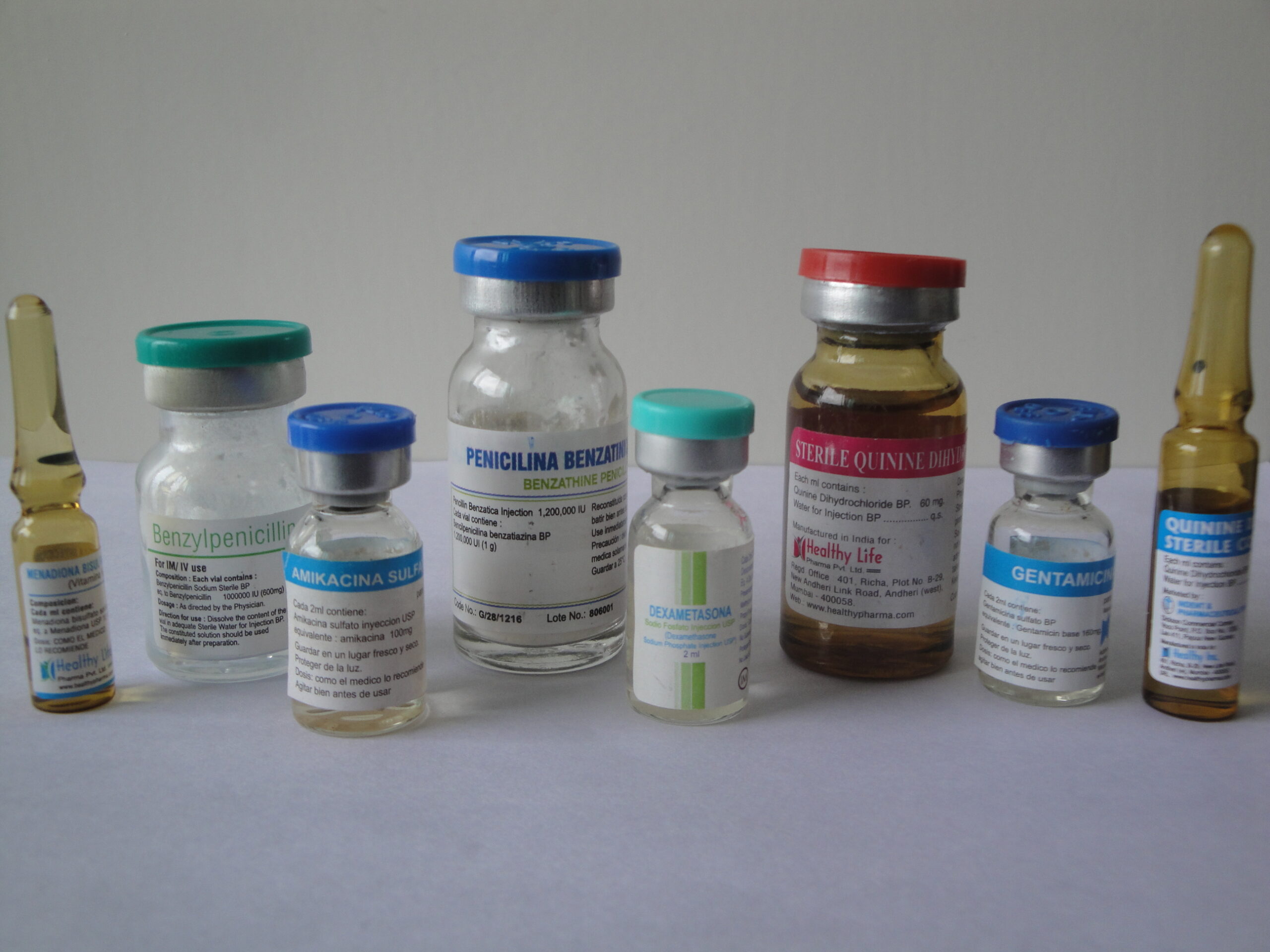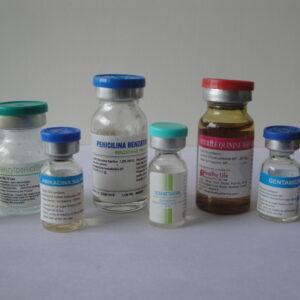Description
Amikacin injection manufacturer
Amikacin Sulphate injection
Amikacin sulfate is an antibiotic medication that belongs to the aminoglycoside class. It is commonly used to treat serious bacterial infections. Amikacin works by inhibiting the growth of bacteria and is particularly effective against Gram-negative bacteria.
The injection form of amikacin sulfate is often administered intramuscularly or intravenously, and the dosage can vary depending on the specific infection being treated, the patient’s weight, and other factors. The 100mg injection likely refers to a specific strength or dosage of amikacin sulfate.
It’s important to note that amikacin is a prescription medication, and its use should be supervised by a healthcare professional. They will determine the appropriate dosage and duration of treatment based on the specific circumstances of the infection.
As with any medication, there can be side effects and potential risks associated with amikacin sulfate. Common side effects may include kidney problems, hearing loss, and neuromuscular blockade. It is crucial to follow the prescribed dosage and consult with a healthcare provider if you experience any unusual or severe side effects.
If you have been prescribed amikacin sulfate or have specific questions about its use, it is recommended to consult with your healthcare provider or pharmacist for personalized information and guidance based on your medical history and condition.
Amikacin sulfate is a type of antibiotic medication used to treat various bacterial infections. It belongs to the aminoglycoside class of antibiotics and is particularly effective against Gram-negative bacteria. Amikacin works by inhibiting bacterial protein synthesis, ultimately leading to bacterial cell death.
Amikacin sulfate is typically administered intravenously or intramuscularly. The dosage and frequency of administration depend on factors such as the severity of the infection, the patient’s weight, and kidney function. The usual dose for adults is around 15 mg/kg/day, divided into 2 or 3 equal doses.
It’s important to note that amikacin sulfate should only be used under the guidance of a healthcare professional, as improper use or overuse of antibiotics can lead to antibiotic resistance and other complications. Additionally, patients should be monitored closely for any adverse reactions or side effects, which may include kidney damage, hearing loss, and nerve damage.
As with any medication, it’s crucial to follow your healthcare provider’s instructions and dosage recommendations precisely. If you have any questions or concerns about amikacin sulfate or its administration, it’s best to consult with a medical professional.
Amikacin sulfate is a type of antibiotic medication used to treat various bacterial infections. It belongs to the aminoglycoside class of antibiotics and is particularly effective against Gram-negative bacteria. Amikacin works by inhibiting bacterial protein synthesis, ultimately leading to bacterial cell death.
Amikacin sulfate is typically administered intravenously or intramuscularly. The dosage and frequency of administration depend on factors such as the severity of the infection, the patient’s weight, and kidney function. The usual dose for adults is around 15 mg/kg/day, divided into 2 or 3 equal doses.
It’s important to note that amikacin sulfate should only be used under the guidance of a healthcare professional, as improper use or overuse of antibiotics can lead to antibiotic resistance and other complications. Additionally, patients should be monitored closely for any adverse reactions or side effects, which may include kidney damage, hearing loss, and nerve damage.
As with any medication, it’s crucial to follow your healthcare provider’s instructions and dosage recommendations precisely. If you have any questions or concerns about amikacin sulfate or its administration, it’s best to consult with a medical professional.
Amikacin sulfate is an antibiotic medication that belongs to the aminoglycoside class. It is commonly used to treat serious bacterial infections. The medication works by inhibiting the growth of bacteria and is particularly effective against certain Gram-negative bacteria.
Here is some general information about Amikacin sulfate 100mg injection:
Indications:Amikacin is often prescribed for the treatment of severe bacterial infections, especially those caused by susceptible strains of Gram-negative bacteria.
Dosage:The dosage of Amikacin sulfate can vary depending on the specific infection being treated, the patient’s weight, and their kidney function. It is typically administered intravenously or intramuscularly.
Administration:Amikacin sulfate is usually administered by a healthcare professional in a hospital setting. The injection is given slowly into a vein (IV) or into a muscle (IM).
Monitoring:Patients receiving Amikacin therapy may require regular monitoring of kidney function, as aminoglycosides can be nephrotoxic (toxic to the kidneys). Blood levels of the drug may also be monitored to ensure therapeutic levels are maintained.
Side Effects:Common side effects may include nausea, vomiting, headache, and injection site reactions. Serious side effects can include kidney damage, hearing loss, and neuromuscular blockade.
Precautions:Amikacin sulfate is generally reserved for serious infections due to its potential for serious side effects. It is important to use it under the supervision of a healthcare professional.
Contraindications:Individuals with a history of hypersensitivity to aminoglycosides or amikacin should not use this medication.
Drug Interactions:Amikacin may interact with other medications, so it’s important to inform your healthcare provider about all the medications you are currently taking.
It’s crucial to follow your healthcare provider’s instructions and complete the full course of treatment, even if symptoms improve before the medication is finished. If you have any concerns or questions about Amikacin sulfate or its administration, it’s best to consult with your healthcare provider for personalized advice.
Amikacin sulfate is an antibiotic medication belonging to the aminoglycoside class. It is commonly used to treat bacterial infections, particularly those caused by gram-negative bacteria. Amikacin works by inhibiting the synthesis of bacterial proteins, ultimately leading to the death of the bacteria.
The dosage and administration of amikacin sulfate can vary depending on the specific infection being treated, the patient’s weight, renal function, and other factors. It is typically administered intravenously or intramuscularly.
It’s important to note that the information provided here is general, and you should always follow your healthcare provider’s instructions regarding the use of any medication. If you have been prescribed amikacin sulfate 100mg injection, it’s crucial to adhere to the recommended dosage and administration schedule, and to inform your healthcare provider of any concerns or side effects.
As with any medication, amikacin sulfate may cause side effects, and your healthcare provider will monitor you for any potential complications. Common side effects may include kidney problems, hearing loss, and neuromuscular blockade. It’s important to report any unusual symptoms or side effects to your healthcare provider promptly.
Do not self-prescribe or self-administer medications without consulting your healthcare provider. They will consider your medical history, the specific infection being treated, and other factors to determine the most appropriate treatment plan for you.
Amikacin sulfate is an antibiotic medication that belongs to the aminoglycoside class. It is commonly used to treat severe bacterial infections, particularly those caused by Gram-negative bacteria. Amikacin works by inhibiting the synthesis of bacterial proteins, ultimately leading to the death of the bacteria.
The dosage of amikacin sulfate can vary depending on the specific infection, the patient’s weight, renal function, and other factors. The 100mg injection you mentioned likely refers to a specific dosage strength of amikacin sulfate.
It’s important to note that amikacin is usually administered intravenously or intramuscularly by a healthcare professional in a hospital or clinical setting. The dosage and duration of treatment should be determined by a qualified healthcare provider based on the specific condition being treated.
As with any medication, there can be potential side effects and contraindications, so it’s crucial for patients to follow their healthcare provider’s instructions and report any unusual or severe reactions. Additionally, amikacin can have potential toxicity to the kidneys and may require monitoring of renal function during treatment.
If you have been prescribed amikacin sulfate or have concerns about your medication, it is important to consult with your healthcare provider for personalized advice and guidance based on your medical history and current health status.
Amikacin sulfate is an antibiotic medication that belongs to the class of drugs known as aminoglycosides. It is used to treat various bacterial infections, particularly those caused by Gram-negative bacteria. Amikacin works by inhibiting the growth of bacteria and is often reserved for serious infections when other antibiotics may not be effective.
The injection form of amikacin sulfate is typically administered intravenously (IV) or intramuscularly (IM) under the supervision of a healthcare professional. It is crucial to follow the prescribed dosage and administration guidelines provided by your healthcare provider.
Common uses of amikacin sulfate include treating infections such as:
Respiratory tract infections
Urinary tract infections
Skin and soft tissue infections
Bone and joint infections
Bloodstream infections (septicemia)
It is important to note that amikacin can have potential side effects and may require careful monitoring of kidney function and hearing, especially with prolonged use or in individuals with pre-existing kidney problems. It is crucial to inform your healthcare provider about any existing medical conditions or medications you are taking before starting amikacin treatment.
As with any medication, it is essential to use amikacin sulfate only under the supervision of a healthcare professional, and the decision to use this antibiotic should be based on a thorough evaluation of the specific infection and the patient’s medical history. If you have questions or concerns about your medication, consult with your healthcare provider for personalized advice.
Amikacin sulfate is an antibiotic medication that belongs to the aminoglycoside class. It is used to treat various bacterial infections. The medication is usually administered intravenously (IV) or intramuscularly (IM).



